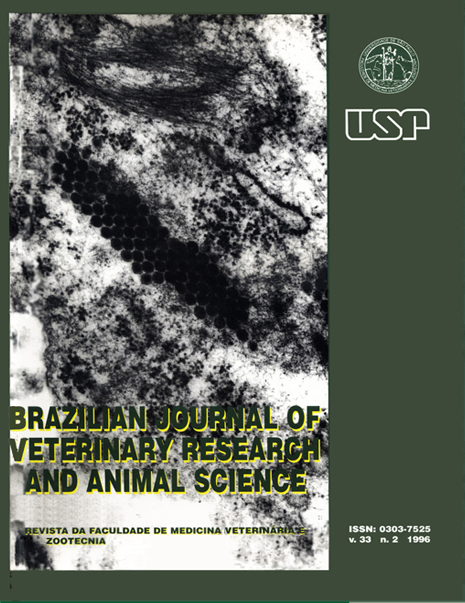Role of intestinal flora in acute hemorrhagic gastroenteritis (Parvovirus infection) of dogs
DOI:
https://doi.org/10.11606/issn.2318-3659.v33i2p107-109Keywords:
Blood, Dogs, Hemorrhagic enteritis, Parvovirus, Bacteria, Campylobacter jejuni.Abstract
In case of severe diarrhea, the clinical picture is worsenned by endotoxic shock. In order to evaluate the role of concomitant enteric bacterial infection or bacteremia, 34 dogs with hemorrhagic enteritis due to parvovirus infection were studied. Blood and fecal specimens were cultured, in an attempt to isolate enteropathogens, as well as Campylobacter jejuni. Electron microscopy was done for virus detection. Presence of parvovirus-like particles in the stools confirmed the diagnosis of parvovirus infection, but entheropathogens isolation attempts were unsuccessful. Neither Salmonella sp, nor enteropathogenic E. coli were isolated, while C. jejuni was cultured from five samples of feces from diarrheic dogs. Concerning hemoculture, Pseudomonas sp, E. coli, Alcaligenes odorans and a nonidentified labile non fermenter Gram-negative rod were isolated from severe cases of parvovirosis. Results allowed the conclusion that concurrent bacterial infection did not play an important role on the evolution of the process, but there was aninvasion of normal intestinal bacteria into the blood stream, leading to the installation of endotoxic shock in cases of fatal parvovirus infection.
Downloads
Download data is not yet available.
Downloads
Published
1996-06-01
Issue
Section
ANIMAL PATHOLOGY
License
The journal content is authorized under the Creative Commons BY-NC-SA license (summary of the license: https://
How to Cite
1.
Hagiwara MK, Mamizuca EM, Pavan M de FB. Role of intestinal flora in acute hemorrhagic gastroenteritis (Parvovirus infection) of dogs. Braz. J. Vet. Res. Anim. Sci. [Internet]. 1996 Jun. 1 [cited 2024 Nov. 12];33(2):107-9. Available from: https://revistas.usp.br/bjvras/article/view/50166





